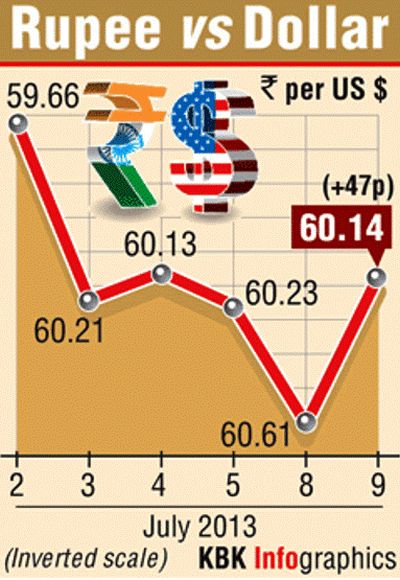 | « Back to article | Print this article |
Rupee rebounds as regulators move to curb speculative trades
The Indian rupee rallied on Tuesday from a record low in the previous session after regulators restricted speculative trading in currency derivatives, although the measures are expected to provide only brief respite for the currency.
Late on Monday, the Reserve Bank of India banned banks from proprietary trading in domestic currency futures and options, while the Securities and Exchange Board of India doubled the margin requirement on the domestic dollar-rupee forward trade.
The National Stock Exchange later clarified that clients with excess open positions in currency derivatives will have until July 30 to cut them to levels mandated by regulators.
The steps are the latest by regulators to curb speculative trading, which would pare short positions in the rupee, after some bankers said they had been discreetly asked last month by the RBI to trim intraday open positions.
However, the rupeeis expected to remain vulnerable unless regulators take stronger measures, as the currency's weak position is seen as a symptom of India’s record high current account deficit.
"There will be some impact on the rupee, but not likely to be massive as this does not change the structural weakness of the Indian external balances," said Nizam Idris, head strategist for currency and fixed income at Macquarie Group.
The rupee ended at 60.14/15 to the dollar, after rising to as high as 59.60 in early trade, and above the record low of 61.21 hit on Monday.
The rupee closed at 60.61/62 in the previous session.
The gains were driven by large unwinding of long-dollar trades in futures and spot markets, dealers said.
"The RBI would like to shift a part of the futures trading to the over-the-counter segment where it has better regulatory control.
"This move may be to instill discipline in the inter-bank forex trading segment," said M Natarajan, treasurer at Scotia Bank.
In the currency futures market, the most-traded near-month dollar/rupee contracts were down around 0.8 per cent in all three exchanges. Volumes remained high at $5.9 billion.
The rupee rebound had a knock-down effect on the domestic debt market as well.
The benchmark 10-year bond yield ended down 2 basis points at 7.55 per cent, after falling as much as 8 bps in early trade.
Separately, the central bank on Monday made it easier for non-bank asset finance companies to raise money abroad, which could help attract dollars in the medium term, dealers said.
Analysts said the RBI would likely resort to other administrative steps in the near-term, most likely the provision of a special window to provide dollars to oil companies, the biggest buyers of greenbacks in domestic markets.
In other measures, the government is taking steps to attract foreign direct investment and could review limits in sectors or issue a sovereign bond to non-resident Indians.
Finance minister P Chidambaram is in the United States this week to drum up investment.
He is seen, however, as struggling to push through proposals to relax rules on foreign direct investment in defence, telecoms, pharmaceuticals and retail.
The 5-year overnight indexed swap ended down 3 bps at 7.57 pct, while the 1-year rate ended 1 bp lower at 7.54 per cent.

© Copyright 2025 Reuters Limited. All rights reserved. Republication or redistribution of Reuters content, including by framing or similar means, is expressly prohibited without the prior written consent of Reuters. Reuters shall not be liable for any errors or delays in the content, or for any actions taken in reliance thereon.
